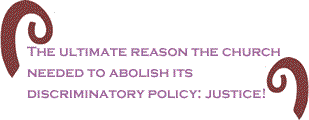Before returning to
New England for the second time,
I served two African American Presbyterian Churches.  And
during that time I never thought, two decades ago, that
the entire church body would change its position on LGBTQ
worshippers.
And
during that time I never thought, two decades ago, that
the entire church body would change its position on LGBTQ
worshippers.
But a historic yet
bittersweet moment happened on October 8th in the Presbyterian
Church (USA).
And the moment didn’t
happen without a long and arduous struggle against the
church’s ecclesiastical heterosexism.
After decades of open
struggle with the church’s recalcitrant attitude and discrimination
against its lesbian, gay, bisexual, transgender, and queer
(LGBTQ) worshippers who wanted to serve as pastors, elders
or deacons, the Presbyterian Church (USA), known as the
more liberal and tolerant branch of the denomination,
finally conducted its first openly gay ordination.
In May of this year,
Amendment 10-A was passed,
meaning the majority of church’s 173 presbyteries ratified
an amendment to its constitution (The Book of Order) that
removes a provision prohibiting the ordination of sexually
active unmarried Presbyterians as church officers. Before
the passing of Amendment 10-A, the constitution required
church officers to be celibate or married to a
member of the opposite gender.
So
on that Sunday of October 8th, many of us Presbyterians
celebrated Scott Anderson’s ordination. Anderson served as co-Moderator of More Light Presbyterians, before
moving to Madison
to become the Executive Director of the Wisconsin Council
of Churches, and he also served as Executive Director
of the California Council of Churches.
Scott stands on the
shoulders of so many of my clergy brothers and sisters
who were either defrock or flatly denied ordination because
they were either opened about their sexual orientation
or their local presbytery suspected they were LGBTQ.

As a church that is
borne out of a liberal Protestant Christian tradition,
the Presbyterian Church’s problem with its LGBTQ worshippers
is a history of how it not only broke the backs and souls
of the many who wanted to serve, but also how the church
recklessly discarded the gifts we bring.
While homophobia is
nothing new in the hallowed halls of most churches, the
Presbyterian Church - with its 2.3 million members in
all 50 states and Puerto Rico that are part of the Reformed
family of Protestantism, descending from the branch of
the Protestant Reformation begun by John Calvin - has
been an embarrassment to itself.
And as a church that
proudly touts itself as “reformed and always reforming,”
when it came to all things LGBTQ prior to this recent
Amendment, the church was not only losing its theological
ground of being one that affirms diversity without divisiveness,
it was also losing its public face of inclusion.
Wrestling with the
issue of scriptural interpretation and faithfulness to
the Bible, the Presbyterian Church at the 190th General
Assembly in 1978 was unabashed with its homophobic renderings
as it relates to LGBTQ worshippers stating, “The repentant
homosexual person who finds God’s power to control his
or her [sexual] desires can certainly be ordained, all
other qualifications being met.”
 LGBTQ
worshippers had second-class status in the church, and
it was maintained not only church policy that forbid us
to serve as pastors, elders or deacons, but also by overriding
decisions made by local parishes in support of inclusion
of us within the body of the church.
LGBTQ
worshippers had second-class status in the church, and
it was maintained not only church policy that forbid us
to serve as pastors, elders or deacons, but also by overriding
decisions made by local parishes in support of inclusion
of us within the body of the church.
However, before the
Presbyterian Church finally abolished its ban on LGBTQ
ministers, elders and deacons becoming ordained, many
LGBTQ worshippers and allies over the years found ways
to include LGBTQ members as church officers.
For example, “More
Light Presbyterians” gave LGBTQ worshippers hope. It is
a coalition of congregations and individuals in the American
Presbyterian Church committed to increasing the involvement
of all people in the church, regardless of sexuality.
More Light churches
endorse the mission statement: “Following the risen Christ,
and seeking to make the Church a true community of hospitality,
the mission of More Light Presbyterians is the full participation
of gay, lesbian, bisexual, and transgender people of faith
in the life, ministry, and witness of the Presbyterian
Church (USA).” These are the Presbyterians who truly uphold
the church’s motto of being reformed and always reforming.
Other examples were
the actions taken at General Assembly. The 210th General
Assembly (GA) in 1998 reaffirmed that the Presbyterian
Church (U.S.A.) was committed “not to exclude anyone categorically
in considering ordained service based on sexual orientation.
And in 2003, the GA Permanent Judicial Commission reaffirmed
that position when it said, “Sexual orientation alone
is insufficient to make a person ineligible for ordination
or installation.”

Why now, many ask,
is the Presbyterian Church (USA) loosening its reins on
LGBTQ worshippers?
Many
within the Church speculate four possible factors:

